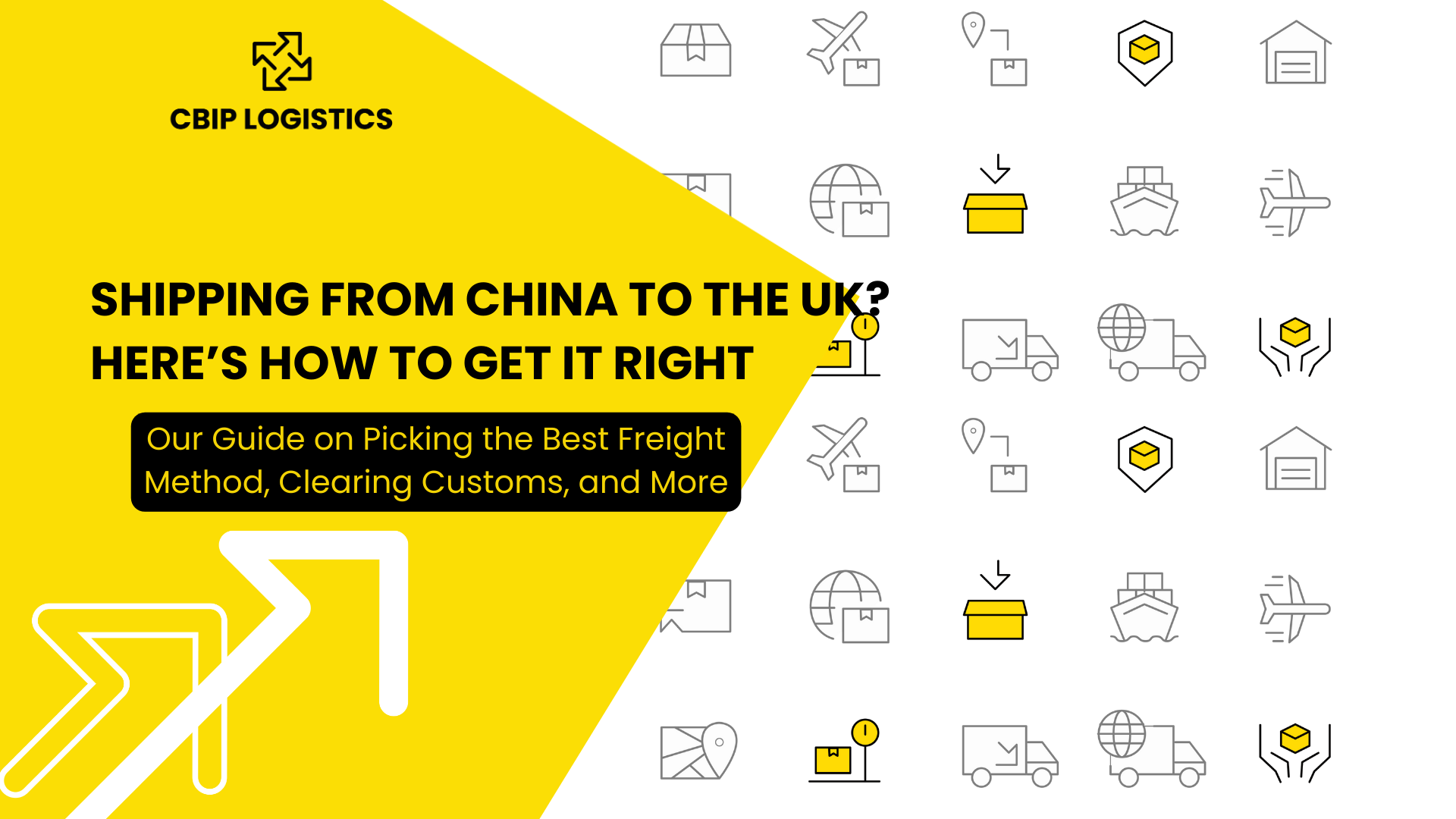Vận chuyển từ Trung Quốc đến Vương quốc Anh? Đây là cách làm đúng

As the world’s manufacturing powerhouse, China ships a huge amount of goods to the UK each year. And British consumers, making up the world’s fifth-largest economy, continue to buy more and more Chinese goods each year.
More than 13% of all UK imports come from China, valued at more than 91 billion USD (nearly £70 billion).
If you’re looking to enter the market, you’re probably wondering where to begin. In a post-Brexit world, UK laws and import regulations are more complicated and complex than ever. Add in language barriers and seemingly endless shipping options, and knowing where to start can feel like an impossible task.
Luckily, CBIP specializes in east-to-west shipping, and we’re here to handle the details for you. Read our brief introduction to shipping from China to the UK below, and learn how we can help you navigate this trade line to expand your business.
What can you ship from China to the UK?
Like most countries around the world, the UK puts restrictions on what goods and materials you can import into the country. China also has export restrictions, so make sure you familiarize yourself with the laws in each country before you try to ship anything from China to the UK.
Goods you can’t import into the UK
For safety, economic, and cultural reasons, the UK government restricts and prohibits some imports. Examples of prohibited goods include:
-
Illicit drugs
-
Offensive weapons
-
Self-defense sprays
-
Rough diamonds
Goods you can’t export from China
For the same reasons the UK restricts imports, China also has strict rules about which goods and materials can’t leave the country. In general, you should know which items are restricted, meaning you need a license or special approval to export them, and which ones are prohibited, meaning that you can’t export them in any circumstance. Here are a few examples of both:
-
Precious metals or products made from them
-
National or foreign currencies
-
Chinese cultural relics
-
Chinese traditional medicines
-
Certain tiger bones and other animal horns
-
Certain chemicals for cleaning agents, like chloroform
-
Certain treated and untreated logs, like mahogany, teakwood, or beech wood logs
How much will shipping cost?
The shipping method, speed, distance, and service you use can make your costs differ dramatically. Your costs won’t stop at transport, though. Don’t forget about duty tax and tariffs the UK places on incoming goods from China.
Import Taxes
Post-Brexit, the UK has implemented new, complicated import tax laws that affect sellers shipping goods into the UK. The rules are different for foreign sellers stocking British shelves versus e-commerce businesses selling directly to British consumers, so make sure you read up on the rules and understand what your situation calls for. (Or you can hire someone to help you, as the official customs website suggests.)
In general, you should be prepared to pay anywhere from 5% to 20% value-added tax (VAT) on Chinese exports, depending on the type of product. The UK has a de minimis threshold of £135, so if you’re shipping a container of goods worth less than that, you won’t have to worry about customs or excise duty.
For tariffs, the UK government has a handy lookup tool for you to calculate potential fees if you want to get an idea of how much you’ll be charged.
Related: New to terms like ‘VAT’ and ‘de minimis’? Check out our terminology cheat sheet.
How long will shipping take?
If you’re shipping to the UK, you’re probably sending your goods by sea, along with 95% of all UK import and export tonnage. Chances are you’ll be using one of the ports listed below, so take a moment to get familiar with a few of your options.
The UK’s Major Ports
While the UK has several major ports spread across England, Scotland, Wales, and Northern Ireland, the three below process massive amounts of international cargo, including shipments coming from China. You can read about other UK ports here.
-
Immingham - This is the largest cargo port in the UK by tonnage, moving more than 55 million tons in 2018.
-
Felixstowe - The busiest port in the UK by TEU alone, Felixstowe is also the 9th busiest port in Europe.
-
London - Central to London’s economy, this port moved over 53 million tons of cargo in 2018 alone.
China’s Major Ports
China has 34 major ports along its 32,000 km of coastline, but these three ports are major players and can help you estimate shipping times.
-
Shanghai - The largest port in the world, the Port of Shanghai is near many manufacturing hotspots and handled over 514 million tons of cargo in 2019.
-
Shenzhen - Located near an electronics manufacturing hotspot on the southeast coast, the Port of Shenzhen handled a little less than 195 million tons of cargo in 2018.
-
Ningbo-Zhoushan - The busiest port in the world in terms of cargo tonnage, this port handled 1.12 billion tons of cargo in 2018.
Shipping Time Estimates
While your carrier, port of departure, and port of entry will all affect your shipping speed, you can generally expect sea transport from China to the UK to take between 30 and 40 days.
Crossing the ocean is just one leg of the journey, though. Don’t forget to factor in that first mile, last mile, or the time it takes to get through customs, which could take anywhere from an additional 24 hours to several weeks.
What rules and regulations should you know?
Protocols for shipping from China to the UK
For people importing into the UK, the government lays out an 11-step process to help you along the way. For people sending goods from China specifically, these steps are especially important:
-
Get an EORI number
You’ll need to apply for an Economic Operators Registration and Identification (EORI) number to move goods into the UK. It should start with GB (for goods going to England, Wales, or Scotland) or XI (for goods going to Northern Ireland). You can apply directly on the website.
-
Check if you should register for VAT
If you do a certain amount of business in the UK each year, you need to register for VAT. Check this website to see if this rule applies to you.
-
Check Chinese exportation laws
If you’re working with a Chinese company, they’llprobably need an export license to send goods worldwide. Export regulations can be just as complicated as import laws, so make sure you check with local authorities in China before trying to move products out of the country.
-
Make your goods declaration
This part can be a little difficult and requires high attention to detail, so many businesses that send goods to the UK hire services to help out with the paperwork.
-
Look up the commodity code for your product
Every product has a commodity code in the UK, and you’ll need to find yours to calculate taxes and figure out if you need any special licenses or permissions.
-
Determine the value of your goods
This step can get a little complicated too. Hiring a customs broker who knows all the rules can save you time and money by keeping your goods from being returned to China.
-
Check your product’s labeling
If you’re sending goods to be sold in British stores, you’ll have to follow strict labeling guidelines. Mislabeled goods may be denied entry to the UK.
If you’re stuck on where to start, you can use the UK’s official import/export website to see what specific rules and regulations apply to the product you want to ship.
Who can you look to for help?
Clearly, getting through UK customs can be complicated — so complicated, in fact, that the UK government itself actually recommends commercial importers hire someone to help with the process. The three options they provide are:
-
customs agents or brokers
-
fast parcel operators
Working directly with any of these can help you move goods along your supply chain or get through customs. But if you want a fully integrated logistics experience that includes
✅ order management
✅ Shipment tracking
✅ access to a global network of logistics partners, and
✅ a personalized shipping plan to meet your business needs
then a 4th-party logistics (4PL) firm will be your best option.
Cross-border logistics made easy with CBIP
Since Brexit and the UK’s departure from the European Union, shipping to the UK has only gotten more complex. If you want a stress-free, comprehensive logistics plan for getting your products from your Chinese manufacturer to your British buyers, CBIP is ready to help you every step of the way.
We have on-the-ground experts in China and logistics partners across the globe. Keep your supply chain moving in sync from the first to the last mile with an international, adaptable network.
Our full-service logistics can do it all: Looking to find freight forwarders or customs brokers recommended by the UK government? We have those connections. We’ll help you make it through customs too, keeping track of all key regulations for you and ensuring you never lose time or money by having your shipment stuck at the border. You can even track the status of your shipments and look at your business trends through our licensed logistics software, giving you insight into the best ways to grow.
If you want to learn more about how we can meet all your logistics needs, send us an email. We’re ready to help you expand into the UK today.






